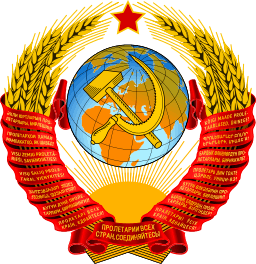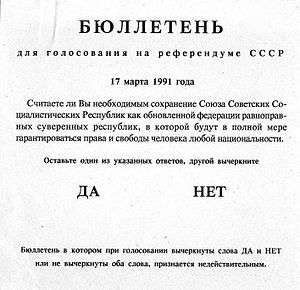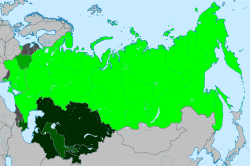Soviet Union referendum, 1991
| Soviet Union referendum, 1991 | ||||||||||||||||||||||
|---|---|---|---|---|---|---|---|---|---|---|---|---|---|---|---|---|---|---|---|---|---|---|
|
Считаете ли Вы необходимым сохранение Союза Советских Социалистических Республик как обновлённой федерации равноправных суверенных республик, в которой будут в полной мере гарантироваться права и свободы человека любой национальности? (see text for translation) | ||||||||||||||||||||||
 | ||||||||||||||||||||||
| Date | 17 March 1991 | |||||||||||||||||||||
| ||||||||||||||||||||||
| ||||||||||||||||||||||
| Referendum held: 17 March 1991 | ||||||||||||||||||||||

A referendum on the future of the Soviet Union was held on 17 March 1991. The question put to voters was

Do you consider necessary the preservation of the Union of Soviet Socialist Republics as a renewed federation of equal sovereign republics in which the rights and freedom of an individual of any nationality will be fully guaranteed?[1]
(Russian text: Считаете ли Вы необходимым сохранение Союза Советских Социалистических Республик как обновлённой федерации равноправных суверенных республик, в которой будут в полной мере гарантироваться права и свободы человека любой национальности?)
(Russian transliteration: Schitayete li Vy neobkhodimym sokhraneniye Soyuza Sovetskikh Sotsialisticheskikh Respublik kak obnovlonnoy federatsii ravnopravnykh suverennykh respublik, v kotoroy budut v polnoy mere garantirovat'sya prava i svobody cheloveka lyuboy natsional'nosti?)
The referendum was made with the aim of approving the Union of Sovereign States and was oblivious to the reform of the economic system question that will take place after the victory of Yeltsin in the elections.
In Kazakhstan, the wording of the referendum was changed by substituting "equal sovereign states" for "equal sovereign republics".[2]
Although the vote was boycotted by the authorities in Armenia, Estonia, Georgia (though not the breakaway province of Abkhazia, where the result was over 98% in favour,[3] and in South Ossetia),[4] Latvia, Lithuania, and Moldova (though not Transnistria or Gagauzia),[5] turnout was 80% across the rest of the Soviet Union.[2] The referendum's question was approved by nearly 70% of voters in all nine other republics that took part.[6] It was the only referendum in the history of the Soviet Union, as the August Coup prevented the formation of the renewed federation, causing the Soviet Union to be dissolved on 26 December 1991.[7][8]
Overview
On December 24, 1990, deputies of the 4th Congress of People's Deputies, having voted by name, decided to consider it necessary to preserve the USSR as a renewed federation of equal sovereign republics, which will be fully ensured human rights and freedoms of any nationality.[9] The referendum considered five questions:
- Do you consider it necessary to preserve the USSR as a renewed federation of equal sovereign republics, which will be fully ensured of human rights and freedoms of any nationality? (Yes/No)
- Do you consider it necessary to preserve the USSR as a single state? (Yes/No)
- Do you consider it necessary to preserve the socialist system in the USSR? (Yes/No)
- Do you consider it necessary to preserve in the renovated Union of Soviet power? (Yes/No)
- Do you feel the need to safeguard the Union in the renewed human rights and freedoms of any nationality? (Yes/No) (Any legal or legislative consequences, in case of acceptance of, or otherwise, was not specified)
On the same day, at the initiative and insistence of the President Mikhail Gorbachev,[10][11] the Congress adopted two decisions on holding a referendum on the private ownership of land [6] and on the preservation of the Union as a renewed federation of equal sovereign of Soviet Socialist Republics [7]. For the adoption of the first resolution voted in 1553 deputies, against - 84, abstained - 70. For the adoption of the second resolution voted in 1677 deputies, against - 32, abstained - 66.[10]
However, concerning the first decision the Chairman YH Kalmykov later explained at a session of the Supreme Soviet of the USSR Supreme Council Committee for Legislation, the president asked to refrain from holding a referendum on the issue of private property.[10]
Second course was given to the decree. It said that "due to numerous appeals of workers expressed concern about the fate of the USSR, and given that the preservation of a single union state is the most important issue of public life, affects the interests of each person, all the Soviet Union's population",[12] the Congress of People's Deputies USSR decided:
1. Conduct a referendum of the USSR to address the issue of maintaining the Union as a renewed federation of equal sovereign Soviet Socialist Republics, taking into account the results of voting for each country separately.
2. To instruct the USSR Supreme Council set a date for the referendum and ensure its measures.
— Resolution of the USSR from LICs December 24, 1990 № 1856-1[12]
On 27 December 1990, Congress of People's Deputies of the USSR decided to enact it adopted on the day the Law of the USSR "On the popular vote (Soviet Union referendum)".[12]
According to Art. 5 of the Law of the USSR "On the popular vote (Soviet Union referendum)" [13] Law of the USSR referendum destination belonged to the Congress of People's Deputies of the USSR, and on matters not related to the exclusive jurisdiction of the USSR Congress of People's Deputies, in the period between congresses – the Supreme Soviet of the USSR. "Based on the fact that no one, except the people can not take the historical responsibility for the fate of the USSR, pursuant to the decision of the fourth Congress of People's Deputies of the USSR in accordance with the law on the referendum of the USSR"[14] On January 16, 1991 the Supreme Council USSR decided that to:
1. Carry out the entire territory of the Soviet Union on Sunday, 17 March 1991, for the Soviet Union referendum on the preservation of the Soviet Union as a federation of equal republics.
2. Turn on the ballot for secret voting the following wording of the question put to referendum, and the answers of voting: "Do you consider it necessary to preserve the Union of Soviet Socialist Republics as a renewed federation of equal sovereign republics, which will fully guarantee the rights and freedoms of all nationalities." "Yes or no".
3. To determine the results of voting by the Union Soviet Socialist Republic as a whole, taking into account the results of voting for each country separately.
— Resolution of the USSR Supreme Soviet of 16 January 1991 № 1910-1
Results
| Choice | Votes | % |
|---|---|---|
| For | 113,512,812 | 77.8 |
| Against | 32,303,977 | 22.2 |
| Invalid/blank votes | 2,757,817 | – |
| Total | 148,574,606 | 100 |
| Registered voters/turnout | 185,647,355 | 80.0 |
| Source: Nohlen & Stöver[15] | ||
In participating republics
| Republic | For | Against | Invalid votes |
Total votes |
Registered voters |
Turnout | |||
|---|---|---|---|---|---|---|---|---|---|
| Votes | % | Votes | % | ||||||
| 56,860,783 | 73.00 | 21,030,753 | 27.00 | 1,809,633 | 79,701,169 | 105,643,364 | 75.44 | ||
| 1,908,875 | 85.9 | 269,007 | 12.1 | 43,276 | 2,221,158 | 2,719,637 | 81.7 | ||
| 447,438 | 83.5 | 78,167 | 14.6 | 10,197 | 535,802 | 668,231 | 80.2 | ||
| 670,488 | 82.6 | 131,522 | 16.2 | 9,999 | 812,009 | 1,008,626 | 80.5 | ||
| 290,380 | 77.9 | 77,339 | 20.8 | 4,888 | 372,607 | 489,436 | 76.1 | ||
| 148,462 | 87.8 | 17,833 | 10.5 | 2,829 | 169,124 | 204,301 | 82.8 | ||
| 317,854 | 76.0 | 92,703 | 22.0 | 7,544 | 418,101 | 551,644 | 75.8 | ||
| 412,842 | 76.0 | 119,678 | 22.0 | 10,883 | 543,403 | 797,049 | 75.44 | ||
| 333,319 | 79.6 | 77,239 | 18.5 | 8,041 | 418,599 | 525,685 | 79.6 | ||
| 459,021 | 80.3 | 101,886 | 17.8 | 10,724 | 571,631 | 677,706 | 84.3 | ||
| 331,823 | 90.2 | 32,786 | 8.9 | 3,249 | 367,858 | 428,307 | 85.9 | ||
| 1,708,193 | 87.5 | 211,516 | 10.8 | 32,059 | 1,951,768 | 2,532,383 | 77.1 | ||
| 126,598 | 91.4 | 9,404 | 6.8 | 2,494 | 138,496 | 171,731 | 80.6 | ||
| 622,714 | 76.0 | 180,289 | 22.0 | 16,137 | 819,140 | 1,103,083 | 74.3 | ||
| 318,059 | 75.9 | 94,737 | 22.6 | 6,216 | 419,012 | 712,139 | 58.8 | ||
| 616,387 | 82.4 | 113,249 | 15.1 | 18,784 | 748,420 | 900,913 | 81.3 | ||
| 415,712 | 76.7 | 116,798 | 21.6 | 9,483 | 541,993 | 688,679 | 78.7 | ||
| 2,709,246 | 94.12 | 169,225 | 5.88 | 25,326 | 2,903,797 | 3,866,659 | 75.10 | ||
| 31,328 | 87.3 | 3,620 | 10.1 | 918 | 35,866 | 174,364 | 20.6 | ||
| 5,069,313 | 83.72 | 986,079 | 16.28 | 71,591 | 6,126,983 | 7,354,796 | 83.31 | ||
| 8,295,519 | 95.00 | 436,560 | 5.00 | 84,464 | 8,816,543 | 9,999,433 | 88.17 | ||
| 2,057,971 | 95.98 | 86,246 | 4.02 | 30,377 | 2,174,593 | 2,341,646 | 92.87 | ||
| 2,315,755 | 96.85 | 75,300 | 3.15 | 16,497 | 2,407,552 | 2,549,096 | 94.45 | ||
| 1,766,584 | 98.26 | 31,203 | 1.74 | 6,531 | 1,804,310 | 1,846,310 | 97.66 | ||
| 22,110,899 | 71.48 | 8,820,089 | 28.52 | 583,256 | 31,514,244 | 37,732,178 | 83.52 | ||
| 9,196,848 | 94.73 | 511,373 | 5.27 | 108,112 | 9,816,333 | 10,287,938 | 95.42 | ||
| 563,916 | 97.6 | 10,133 | 1.8 | 3,668 | 577,717 | 584,208 | 98.9 | ||
| Source: Direct Democracy | |||||||||
In republics not participating in the Soviet referendums
An official referendum had been held in Estonia on 3 March 1991 on whether to re-establish the Estonian republic that had been occupied by the Soviet Union in 1940. The result was 77.8% in favour of re-establishing the Estonian republic.[16] Latvia also held an official referendum on 3 March 1991, when the overwhelming majority voted to re-establish the independent Latvian republic.
Consequently, in these republics pro-Soviet front-organisations organised voluntary referendums without official sanction.[17][18] Turnout of voting here was considerably less than 50% of the franchised voters of these countries, but this information was not included in the official statement of the Central Commission of the Referendum of USSR.[19]
| Republic | For | Against | Invalid votes |
Total votes |
Registered voters (not equal to franchised voters) |
Turnout (based on registered, not franchised voters) | ||
|---|---|---|---|---|---|---|---|---|
| Votes | % | Votes | % | |||||
| 2,541 | 72.46 | 966 | 27.54 | 42 | 3,549 | 4,923 | 72.09 | |
| 43,950 | 99.98 | 9 | 0.02 | 53 | 44,012 | 45,696 | 96.31 | |
| 164,231 | 98.5 | 1,566 | 0.9 | 747 | 166,544 | 318,317 | 52.3 | |
| 211,090 | 95.46 | 10,040 | 4.54 | 1,110 | 222,240 | 299,681 | 74.16 | |
| 415,147 | 95.84 | 18,015 | 4.16 | 3,621 | 436,783 | 670,828 | 65.11 | |
| 496,050 | 99.13 | 4,355 | 0.87 | 970 | 436,783 | 582,262 | 86.11 | |
| 688,905 | 98.72 | 8,916 | 1.28 | 3,072 | 700,893 | 841,507 | 83.29 | |
| Source: Direct Democracy | ||||||||
Additional questions
In several of the republics, additional questions were added to the ballot. In Russia, an additional question was asked on whether an elective post of the president of Russia should be created. In Kirghizia, Ukraine and Uzbekistan the additional question was on the sovereignty of their republics as part of a new union.[2]
Kirghizia
In Kirghizia, voters were also asked "Do you agree that the Republic of Kirghizistan should be in the renewed Union as a sovereign republic with equal rights?" It was approved by 62.2% of voters, although turnout was lower at 81.7%, compared to 92.9% in the Union-wide referendum.[20]
| Choice | Votes | % |
|---|---|---|
| For | 62.2 | |
| Against | 37.8 | |
| Invalid/blank votes | – | |
| Total | 100 | |
| Source: Nohlen et al. | ||
Ukraine
In Ukraine, voters were also asked "Do you agree that Ukraine should be part of a Union of Soviet sovereign states on the basis on the Declaration of State Sovereignty of Ukraine?"[21] The proposal was approved by 81.7% of voters.[21]
| Choice | Votes | % |
|---|---|---|
| For | 25,224,687 | 81.7 |
| Against | 5,655,701 | 18.3 |
| Invalid/blank votes | 584,703 | – |
| Total | 31,465,091 | 100 |
| Registered voters/turnout | 37,689,767 | 83.5 |
| Source: Nohlen & Stöver | ||
At the same day a referendum in the Galician provinces Ivano-Frankivsk, Lviv, and Ternopil asked the three regions of the USSR about the creation of independent state of Ukraine.[22][23] 88% of the voters in this referendum supported Ukraine's independence.[24]
Uzbekistan
In Uzbekistan, voters were also asked "Do you agree that Uzbekistan should remain part of a renewed Union (federation) as a sovereign republic with equal rights?" It was approved by 94.9% of voters, with a turnout of 95.5%.[1]
| Choice | Votes | % |
|---|---|---|
| For | 94.9 | |
| Against | 5.1 | |
| Invalid/blank votes | 1.1 | |
| Total | 9,824,304 | 100 |
| Source: Nohlen et al. | ||
See also
Notes
- ↑ Referendum was held only in Abkhazia and South Ossetia
References
- 1 2 Dieter Nohlen, Florian Grotz & Christof Hartmann (2001) Elections in Asia: A data handbook, Volume I, p492 ISBN 0-19-924958-X
- 1 2 3 Referendum of March 1991 Russian History Encyclopedia on Answers.com
- ↑ Duffy-Toft, M (2003) The geography of ethnic violence: identity, interests, and the indivisibility of territory p98
- ↑ (in Russian) Chronicle of the Georgian-Ossetian conflict (1988-2008) Archived 2009-05-31 at the Wayback Machine.
- ↑ Historical Overview of the PMR (Transnistria, Transdniestr, Transdnestr, Pridnestrovie) Archived 2009-01-22 at the Wayback Machine.
- ↑ Understanding the Cold War: A Historian's Personal Reflections by Adam Bruno Ulam, Leopolis Press, 2000, ISBN 0-9679960-0-7 (page 353)
- ↑ Russia and the World Economy: Problems of Integration by Alan H. Smith, Routledge, 1993, ISBN 0-415-08925-5 (page 1)
- ↑ Referendum on the preservation of the USSR, RIA Novosti (2011)
- ↑ Постановление СНД СССР от 24 декабря 1990 года № 1853-1 «О сохранении Союза ССР как обновлённой федерации равноправных суверенных республик» // Ведомости СНД и ВС СССР. — 1990. — № 52. — ст. 1158.
- 1 2 3 Любарев А. Е. Выборы в Москве: опыт двенадцати лет. 1989—2000. — М.: Стольный град, 2001. — 412 с. — ISBN 5-89910-019-2.
- ↑ Съездом было принято два постановления о проведении референдумов по вопросу о частной собственности на землю
- 1 2 3 Постановление СНД СССР от 24 декабря 1990 года № 1856-1 «О проведении референдума СССР по вопросу о Союзе Советских Социалистических Республик» // Ведомости СНД и ВС СССР. — 1990. — № 52. — ст. 1161.
- ↑ Закон СССР от 27 декабря 1990 года № 1869-1 «О всенародном голосовании (референдуме СССР)» // Ведомости СНД и ВС СССР. — 1991. — № 1. — ст. 10.
- ↑ Постановление ВС СССР от 16 января 1991 года № 1910-1 «Об организации и мерах по обеспечению проведения референдума СССР по вопросу о сохранении Союза Советских Социалистических Республик» // Ведомости СНД и ВС СССР. 1991. — № 4. — ст. 87.
- ↑ Nohlen, D & Stöver, P (2010) Elections in Europe: A data handbook, p1647 ISBN 978-3-8329-5609-7
- ↑ "Chronology". 6 September 2012.
- ↑ Об итогах референдума СССР, состоявшегося 17 марта 1991 года (Из сообщения Центральной комиссии референдума СССР) // Известия. — 1991. — 27 марта.
- ↑ (in Russian) Воля, которую мы потеряли... "Время" № 5. 16 марта 2001 года
- ↑ (in Russian)Сообщение Центральной комиссии референдума СССР об итогах референдума СССР, состоявшегося 17 марта 1991 года // Правда. — 1991. — 27 марта.
- ↑ Nohlen et al., p443
- 1 2 Nohlen & Stöver, p1985
- ↑ Dissolution: Sovereignty and the Breakup of the Soviet Union by Edward W. Walker, Rowman & Littlefield, 2003, ISBN 0742524523 (134)
- ↑ The Ukrainian West: Culture and the Fate of Empire in Soviet Lviv by William Jay Risch, Harvard University Press, 2011, ISBN 0674050010, (page 4)
- ↑ Cleft Countries: Regional Political Divisions and Cultures in Post-Soviet Ukraine and Moldova (Soviet and Post-Soviet Politics and Society 33) by Ivan Katchanovski, 2006, ISBN 389821558X (page 40)
External links

